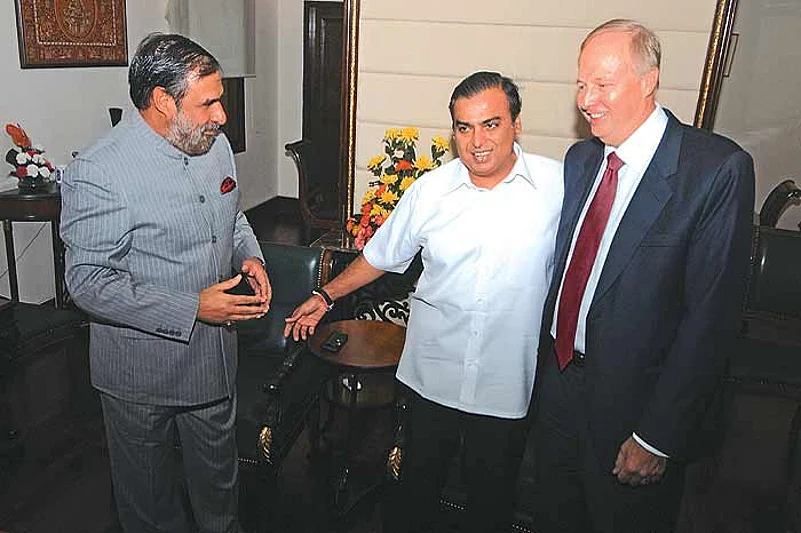The Seesaw Saga
- Going against SC verdict on K-G basin case, RIL seeks say in gas pricing
- PetroMin declines RIL’s demand for gas price at import parity rates
- Free pricing not the norm, will impact consumer industries, end products
- RIL move on CBM gas price also seen as a “ruse” to revise K-G basin gas price
- Government asks RIL to withdraw its notice, but will seek arbitration soon.
***
The high-octane battle between the Union petroleum ministry and Reliance Industries over the D-6 block in the Krishna-Godavari basin has acquired a fresh dimension. Bolstered by an upcoming formal government approval of its 30 per cent stake sale in 21 exploration blocks to BP for $7.2 billion, RIL is upping the ante by asking the government to free gas pricing (fixed at $4.2 per million btus for the D-6 block, pending a revision due in 2014). What the company is seeking is import parity price.
It’s ironical that RIL’s demand to change the terms of reference comes 20 months after RIL’s Mukesh Ambani won a high-pitched legal battle against his younger brother Anil over allocation of gas and its pricing. Mukesh then roped in the government to buttress his plea that RIL does not have any say in the matter. The Supreme Court judgement of May 7, 2010, went in his favour, with the pronouncement that gas being a national asset, “the government has the power to determine the valuation as well as the price for the purpose of the psc (production sharing contract)”.
“Why is RIL raising the price issue now, when gas production from its K-G basin block is falling? It is a brazen kind of argument to serve its own ends,” says a senior petroleum ministry source. In its arbitration notice, RIL has criticised the government gas pricing policy, saying imported gas is being contracted at higher prices by public sector agencies.
This also comes at a time when the petroleum ministry is mulling options to serve RIL an arbitration notice to penalise it for non-delivery of committed gas from the K-G D-6 block. But before the ministry could act, in November 2011, RIL served an arbitration notice. Though the ministry has asked RIL to withdraw the notice on “technical grounds”, RIL is unlikely to drop its aggressive stance. On the ministry’s future course, the senior petroleum ministry source says, “Before the first half of February, we will be serving them a notice. Ultimately, as of now, the matter will go for arbitration.”
While these legal games continue, the real battle is about trying to influence opinion on who determines the gas price—the government or the contractor? RIL had raised the issue in an indirect manner late last year: set to produce an estimated 10 mmscmd (million metric standard cubic metres per day) of gas from its two coal-bed methane blocks in Madhya Pradesh and Chhattisgarh, RIL asked the government for freedom to sell it at par with imported regassified LNG, which is sold at over $11 per million btus.
From a government point of view, leaving the pricing decision to the contractor in one case could open up a Pandora’s box: it holds implications for other exploration blocks. There would be an impact on the end price of power and fertilisers if gas gets costlier. In any case, domestic gas—be it in Qatar or the US—is priced lower than imported fuel. “The government can’t allow a price the Indian market cannot bear,” says Probir Sengupta, former petroleum secretary.
RIL sources, however, say they are seeking parity with Japanese Crude Cocktail (JCC), as the calorific value of cbm gas is the same as that of LNG. Market experts also point out that unlike crude oil, there is no international benchmark for natural gas pricing, which depends largely on how it is transported and how far it travels. Without a national gas grid, it is premature to talk of a market-determined gas price in India, says energy expert T.N.R. Rao. “Once the major trunk lines are interconnected, you can fix a reference or balancing price, like in Britain,” he points out.
Citing the case of Amguri field in Assam, where the government cancelled the contract of the operator last year for reauctioning, Rao says there is a precedent which could be exercised if the contractor fails to keep its K-G basin production commitment. Then, Planning Commission member B.K. Chaturvedi has another idea: like the take-or-pay clause contractors often negotiate with buyers, Chaturvedi is all for government negotiating a “supply-or-pay clause” with contractors. Of course, where production is good, he also favours a slight increase in price as incentive. While these are policy issues, on which the government can deliberate, the fact is RIL is yet to deliver on its promised gas. Will the government respond befittingly?


























